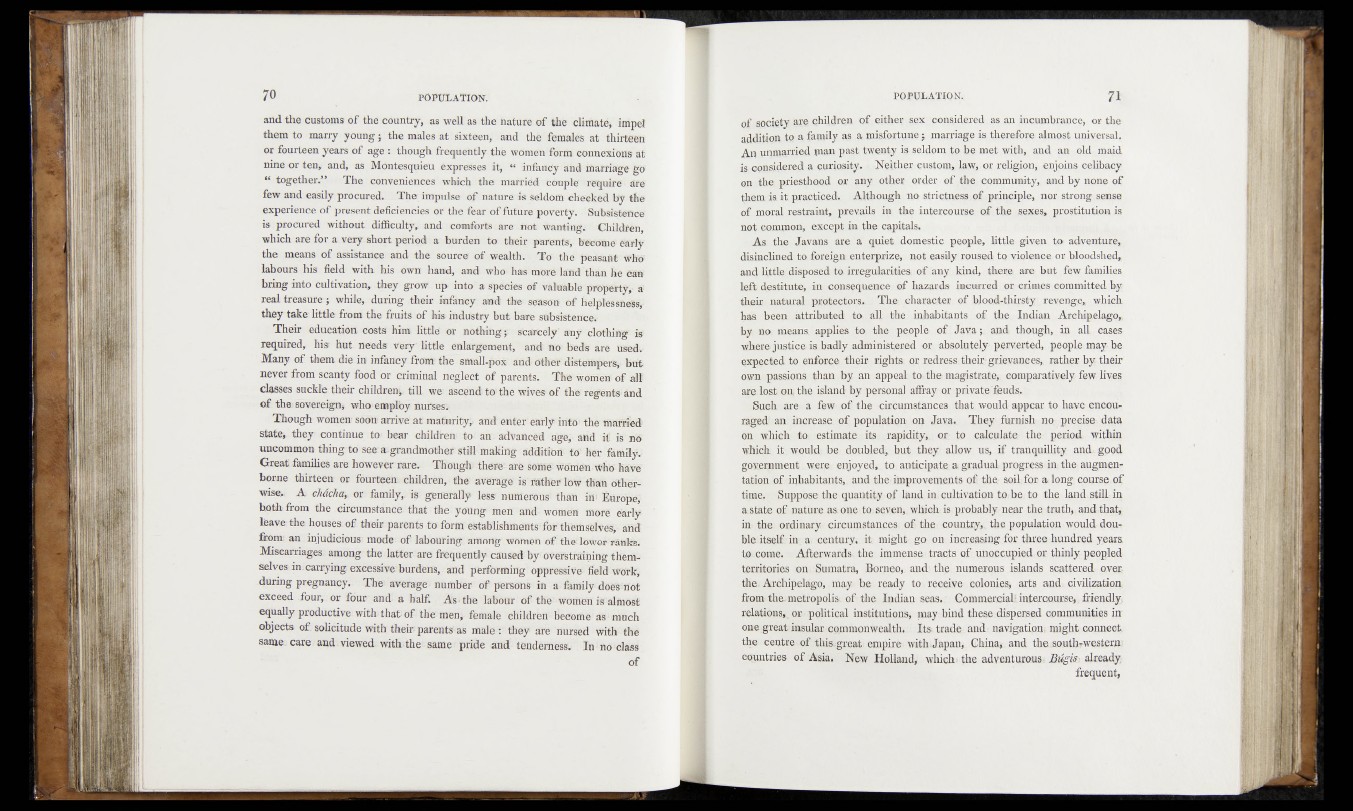
and the customs of thé country* as well as the hatur'e of the clhÉatéj impel
them to marry young} the males at Sixteen* and thé females at thirteen
or fourteen years of age s though frequently the women form connexions at
nine or ten, and, as Montesquieu expresses it, “ infancy ahd nfiai-riagg go
“ together.” The conveniences which the married couple require' are
few and easily procured. The impulse of nature is Seldom checked by the
experience of present deficiencies or" the fear of future poverty. • Subsistence
is procured without difficulty, and comforts ar© Ok* Wanting# OMhfeén,
which are for a, very^short period a fended to their preuts, become" e&sfy
the means of assistance and the source of wealth. To the pteafsafit Who*
lahours his field with Ms own haard, and who hats more land than ie ëm
hrmg into cultivation, they grow up into a species of valuable property*’ a1
real treasure; while, during their infancy mid the season of Mplêésheis*-
they take little: from tie fruits of k b industry hut fe®e stfesfestètfGév
Then- education- costs him. little or nothing } scarcely stay clothing is
required, Ms hut needs very little enlargement, and no- beds are used.-
Many of them die in infaneyfrom- the^ small-pox and ether distempers*, but
never from scanty food or criminal neglect of parents. The wómeir of all
dasses suckle their children}, till we* ascend: to» the wives- of thé’rejfénfS’and
of the: sovereign, who emplby mufsesv
Though wome® soon arrivé at. maturity;, and enter' early-'idtO1 the tnatïiëd?
state, they continue to1 bear chikfretu to1 an advanced age;- slid i# is no
uncommon thing to see: a'> grandmother still maling a'd&tibif to5 her family.
Great families are however.'rare. Though there- are só'öïé Women - whb Kaye'
borne Ifiirteenr or four-treete children, thé average' is’Oatiffer low than dÖiëf-
wise« A. clidcha, or family,, is generally lets' nuMerousi thah iP ÉdrÖpie,--
both from the . circumstanGé that die: young-men and- wötiiéii rnöfë ëarly
Ifeave- the houses ofi their parents to form oStaMishméöts- foif theih^lve#,-. and
ftom. an injudicious: mode: of labouring among' women of thetiowef rankfe*
Miscarriages among the latter are frequently caused by- óverftraihing tbèm-i
selves- in.canying exeessive’burdetfs, and performing oppressive^ field work,
during pregnancy.. The; average number- óf persons in a-family- döéfedtöt
exceed four; , or four and- a half A?s • the labour óf the^Wümen i& almost
e^iahy productive with that Of the men, female children' tiecèttie asÏ much
objects of solicitude with their parents'-as male : they* are rtursed Vrith the
smne care and . viewed, with-the same pride and tenderness'.- In 1 no class
of
of society at'O children of..eit|ieB,^;;eq^dejre^. as an incumbrance, or the
addition tp a family a? a misfortune.marriage is therefore almost universal.
An unmarried man past; twenty i^sel-dom. jo met with, and an- old maid
is considered1 a curiosity.« Ni§|theifc ousted},, laj^sj or religion, oojpips celibacy
on The. priesthood of ®ip other order of &e community,, and by none of
the® ia it. prae-tioed. Although no strietnes&ef principjej, nor strong-.sefflse
of moral restraint, prevails in the intercourse: of the sexes, prostitution is
nof common, except in the. capitals.
As th,e Javans are a quiet, domestic people,,MttJ&. given-to* adventures,
disinclined to foreign, enterprize, not easily' roused tQ violence or Woodshedg-
andlqttte disposed: to irregularities, of jany^kind, there: fm b u | .few families
loft destitute, in consequence of hazards i«s?«o?ied or crimes committed by
rinftin natural protectors,. The: character of Moed-thirsfey^reiaeiie^ which
has been attributed to all the inhabitants of. the. Indian Archipelago,
by no. means, applies to. the pqpple of J a v a a n d though., ia all., cases
where justice, is., badly administered or absolutely- pcrv,erte.d> people may. be
expected to enforce, their rights, or cedress^theu? grievances,, rather- by then-
own, passiona than by an appeal tinfche magistrate,, comparatively few. lives
are lost opj the island by personal affray orptivats.-ffeuds.,
Such, are a few- of the circumstances that would appear to haye encam.
raged--an; increase, of population op Javav They furnish no ,, precise-, data,
on which, to estimate its. .rapidity*, or; to calculator the.- period within
which it. w.ouldt be doubled*, but they allow us, if tranquillity- and., good
gilserpment. w.ero; eiyoyedj, to anticipate.afp»duakprogpes®sM*fh^'ay®:a©J1'
tation iof .-inhabitants,, and the: improvements ofi the? aoihfon g4oog{ cpurse.of
time, .Suppose,-the quantity; of land ini cultivation tin be. to the land.still- in
a state of- nature as; one -.to* seven*, which is. probably near the. truth,, andfhat».
in the ordinary, circumstances,- of the, country,, the population would- do.u-!
hle-itself. in a. century*. ;iti might go on increasing fop three- hundred years
tp-..come. Afterwards; the immense tracts of unoccupied, or- thinly- peopled
territories on. Sumatra, Borneo,, and: the; numerous islands scattered over
the. Archipelago, may be ready to receive colonies, arts and. civilization
from-the; metropolis;. of' the Indian seas..' Gommereialf intcroousso,! friendly*
relations,, or - political institutions, may^hind theseidispexaed communities Irr
oneigreati insular-common wealth. Its; trade and; navigations might connect,
the centre ;©f tbis^great. empires with «Japan* GMna» and the ssouthy westerns
countries of Asia* New Holland* wMch> the adventurous- Bugis> already
frequent.